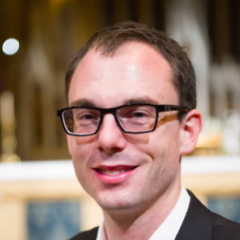Another Mozart opera and another intriguing modern production from Opera Australia. The whole opera was presented as entertainment for a wedding reception, with a bride and bridegroom sitting at two corners of the stage, their sole purpose for the production to observe the unfolding comedy on stage. With their backs to the audience, it was almost as if we were their invited wedding guests, enjoying the entertainment with them.
The opera is subtitled “The School for Lovers”, and to some extent it is a humorous commentary in how lovers’ affections can change in a short space of time. The whole plot stems from a bet made by Don Alfonso that he could make his two friends’ fiancées break their promise of fidelity in twenty-four hours. The opening scene, in which this wager is made, presents the two friends, Ferrando and Guglielmo, as boxers, playfully enjoying a training session with Don Alfonso. Despite the apparent absurdity of presenting the friends in such a way in a Mozart opera, the situation was in fact entirely plausible in a contemporary production, turning the bet into a light-hearted competition between friends. These modern productions often serve to highlight how little human nature has changed in the last few hundred years.
Ferrando and Guglielmo’s fiancées are first presented on stage relaxing in bathing costumes awaiting the return of the men, when they are given the news that Ferrando and Guglielmo have to go off to battle. Ferrando and Guglielmo return to Fiordiligi and Dorabella to make their goodbyes, each of them sure of their fidelity. However, Don Alfonso and his hired hand, Despina, spend the rest of the opera trying to convince Fiordiligi and Dorabella that their fiancés may never return and that they should enjoy life and look for other lovers. In the meantime, the disguised Ferrando and Guglielmo pretend to be suitors, playing their part in the wager, trying to break the fidelity of Fiordiligi and Dorabella.
Così fan tutte only has six principal singing parts: the two pairs of lovers, Don Alfonso and Despina. Therefore it requires a lot of charisma and for the characters to play off each other with ease, especially by Ferrando and Guglielmo, who have the most ‘acting’ to do, attempting to woo the other’s lover. This was done to great effect by Stephen Smith and Samuel Dundas, playing Ferrando and Guglielmo respectively, who attempt everything to gain the affections of the women.
The singing was of a very high quality. The singers’ voices blended sumptuously in the closing parts of each act, creating that wonderful Mozartian feature where each character is singing differing texts, but creating unity by combining seamlessly to create exquisite music. For me, however, there were two musical highlights. The celebrated trio sung by Fiordiligi, Dorabella and Don Alfonso, “Soave sia il vento”, was beautifully delivered with wonderful, oscillating strings beneath them, providing a balanced, light, airy accompaniment. The other highlight was Fiordiligi’s great aria in Act II, where she pronounces her shame at having allowed herself to be wooed. This was sung with great passion and emotion by Sharon Prero. Underneath her, the Australian Opera and Ballet Orchestra, as they did for the whole opera, played very sensitively and with wonderful shape. There was also some great horn playing in this aria.
The opera concludes with Don Alfonso winning his bet and the characters wondering how they could allow their hearts to change so much in such a short space of time. However, in good faith, they forgive each other and reflect upon life’s whirlwinds, commenting on the fickle nature of humanity and maybe with a lesson for us all: how we should look upon life’s woes and problems and allow ourselves not to be so troubled by them, but instead allow ourselves to see the funny side.


